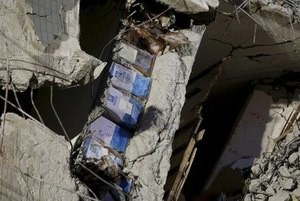By J.R. Wu
TAINAN, Taiwan (Reuters) - When an earthquake struck the Taiwanese city of Tainan in the early hours of Saturday morning, Wu Hsiu-chi's unit in the seven-storey Wei-guan Dragon Door World Family Building shook hard, but survived with little damage.
In another taller apartment block, built by the same developer in the same neighbourhood, scores of residents were not so lucky.
The lower floors of the Wei-guan Golden Dragon Building collapsed on top of each other during the 6.4 magnitude tremor, before the entire U-shaped complex toppled in on itself. At least 63 people were killed and more than 50 others are still trapped in the wreckage, with hopes of survival all but gone.
Prosecutors took the developer behind the collapsed building, Lin Ming-hui, into custody on Tuesday, holding him and two men, Chang Kuei-pao and Cheng Chin-kuei, identified as architects also involved in the building's construction, on suspicion of professional negligent homicide.The three men have not been charged as the investigation into the building's collapse is ongoing. They have not made any comment since being taken into custody.
Lin's Wei-guan Construction built three other buildings in Tainan, Taiwan's oldest city, including Wu's home.
Concerned about improper building techniques identified at the Wei-guan Golden Dragon and irregularities in Lin's business dealings, officials say they are now looking at those buildings.
"I am thinking about (moving), but it's a money issue," Wu said, when asked what she thought about living in a complex built by the same company behind the collapsed building.
INSPECTIONS
Tainan Deputy Mayor Tseng Shu-cheng said the city would inspect the remaining buildings with links to Lin's Wei-guan Construction.
"Only if we determine it is a dangerous building" would the local government be able to consider providing assistance to residents who may want to leave the properties, Tseng added.
The city’s Public Works Bureau said they were working through a list of at least 40 buildings to inspect, and planned to examine two of the surviving Wei-guan buildings this week, said Wu Chao-min, who handles building usage and management issues at the bureau.
The Public Works Bureau did not have records of structural and safety assessments of either of the buildings conducted previously, he said, adding that such assessments were usually done at the request of the building management or residents and were not required to be filed with the local government.
The 17-storey Wei-guan Golden Dragon, completed in 1994, was the only major high-rise in the city of two million people to have completely collapsed.
Lin Ming-hui's lawyer, Li Meng-che, told Reuters his client
felt he had done nothing wrong.
"He said he followed procedures. The project was so big he could not have done the structure or design all by himself," Li said, adding he was not able to comment on other buildings Lin was involved in.
The local court said Chang did not yet have legal representation, while the lawyer for Cheng, the other architect, could not immediately be reached for comment.
The Tainan District Prosecutors Office said it suspected Lin of cutting corners during construction of the Wei-guan Golden Dragon building.
The design of the construction did not match calculations made in its structural and steel blueprints, the prosecutors office said in a statement.
At least half of the main beam joints were missing compared to the building's structural calculation books, the prosecutors office said.
"The structural system of the building was pretty poor," said Sheen Mau-song, a professor of civil engineering and member of the Taiwan Civil Engineering Association who is part of the government's team investigating the collapse.
"There were very few pillars on the first floor, the pillars were quite scattered about, and the materials, from the weakest side, were destroyed."
Reuters was not able to reach Lin or his lawyer to comment on those findings.
Prosecutors and city government officials are also investigating Lin's business practices.
"It is clear that this individual has a routine of changing his name and opening a company and closing a company," Hsiao Po-jen, director of the legal affairs department of the Tainan City government, told Reuters, without providing evidence.

Reuters was not able to independently confirm those details and Lin's lawyer declined to comment on the possible name changes and companies he used.